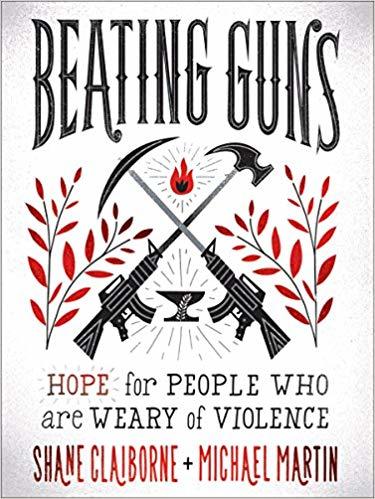What do you think?
Rate this book


288 pages, Paperback
Published March 5, 2019
A Pew Research Center survey showed that 41 percent of white evangelicals ... owns a gun. Compare that to the 30 percent of the general population who own a gun. The demographic with the highest rate of gun ownership is white, evangelical Christians. The followers of the Prince of Peace are packing heat. Praise the Lord, pass the ammunition.The above fact is one reason Shane's ability to talk in Christian vernacular is significant because those are the people who need to hear this message.
Might it be time to say that automatic and high-capacity semiautomatic guns do not belong on our streets? When would anyone really need to fire off one hundred rounds in one minute? (p239)
Maybe we can also explore new technology, like smart guns. ... Smart guns have a trigger that recognizes the fingerprint of the designated owner, and without the fingerprint verification the gun will not shoot. (p239)
The restrictions placed on the Centers for Disease Control and Prevention have prohibited it from studying gun violence and need to be removed and the funding restored. It is absurd that we do not have recent data because the gun lobby has forced the data to be destroyed, since what it shows could be bad for the firearms industry. (p240)
... the one-handgun-a-month law, which would limit the amount of handguns that one person can buy to twelve a year. It makes a lot of sense .... (p250)
Should we really have that Barrett .50-caliber gun that can shoot a plane out of the sky? Should we have bullets that are designed to penetrate a bulletproof vest of a police officer? Why does a law-abiding citizen need a silencer on their gun? (p251)
The industry that creates one of the most dangerous products you can buy enjoys total immunity when it comes to any responsibility for harm done. Toy weapons have more regulations than real weapons. If you shoot your friend's eye out with a Nerf gun, you can sue Nerf. But not so with a Winchester rifle or an AR-15. It's time for the weapons industry to take the same responsibility as every other industry. ... Likewise, gun shops that sell guns irresponsibly should be accountable for the lives that are lost. (p253)
‚Äùevil can be opposed without being mirrored‚Ķoppressors can be resisted without being emulated‚Ķenemies can be neutralized without being destroyed.‚Ä�Finally the authors remind us that the opposite of love is not hate, but fear. They explain that ‚Äúfear not‚Ä� is the most reiterated commandment n the Bible and that powerful people who are afraid are the most dangerous elements in the world. We really do have more to fear from fear itself. We need courage to stand in front of armed neighbors and say no to guns, but these men are handing us the tools.
From a Bushmaster ad for an assault rifle: ‚ÄúConsider your man card reissued.‚Ä�The authors take on the NRA with vigor, often with details to show how most gun owners do not agree with their radical positions. They also take on their real target audience ‚Ä� evangelical Christians who embrace a gun culture. They call out Jerry Falwell, who encourages his Liberty University students to take a free course that will allow them to earn a concealed carry permit. Liberty opened a new shooting range in 2018 during Easter week. The authors wryly note, ‚ÄúNothing says ‚ÄòChrist is risen‚Ä� like a gun range.‚Ä�